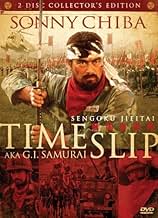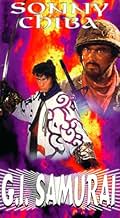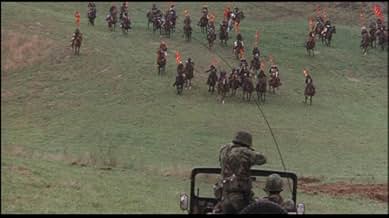NOTE IMDb
6,4/10
1,2 k
MA NOTE
Ajouter une intrigue dans votre langueJapanese soldiers time travel to feudal era. Their lieutenant allies with samurai lord to become Shogun. Both seek power through different eras' warfare.Japanese soldiers time travel to feudal era. Their lieutenant allies with samurai lord to become Shogun. Both seek power through different eras' warfare.Japanese soldiers time travel to feudal era. Their lieutenant allies with samurai lord to become Shogun. Both seek power through different eras' warfare.
- Réalisation
- Scénario
- Casting principal
- Récompenses
- 3 nominations au total
Shin'ichi Chiba
- Lt. Yoshiaki Iba
- (as Sonny Chiba)
Avis à la une
"GI Samurai" sees Sonny Chiba and some other guys get transported back to civil war stricken feudal Japan for no particular reason, and much carnage ensues. It's a rather over the top essay of sword vs. machine gun that ultimately yields some interesting results.
The plot essentially runs along the rails that you might expect from the title; initial fish-out-the-water antics ("what is this flying metal box?" etc etc), "aren't we better off here" discussions and ultimately a huge battle. The latter is proof that the film doesn't take itself seriously at all, the carnage taking up most of the second half as samurai army battles Chiba's platoon; a face off one would fully expect from the title but it still manages to overwhelm with its inventiveness and extravagance. It's certainly one of the most unique battle sequences of its time and doesn't drag despite its extended length.
Chiba gives a gruff performance as Iba, initially a good leader but someone who finally finds himself questioning his own morals as the situation slowly has an effect on him. This is certainly one of his better vehicles from his terrific CV. By the final act the two worlds have had such an effect on each other you have to wonder if it was a bit of nihilism on the part of the writers, as they seem to be asking "weren't we better off back then?'. But this is maybe reading a bit much into was can generally be described as a hugely entertaining two hours of (almost) non stop action.
The plot essentially runs along the rails that you might expect from the title; initial fish-out-the-water antics ("what is this flying metal box?" etc etc), "aren't we better off here" discussions and ultimately a huge battle. The latter is proof that the film doesn't take itself seriously at all, the carnage taking up most of the second half as samurai army battles Chiba's platoon; a face off one would fully expect from the title but it still manages to overwhelm with its inventiveness and extravagance. It's certainly one of the most unique battle sequences of its time and doesn't drag despite its extended length.
Chiba gives a gruff performance as Iba, initially a good leader but someone who finally finds himself questioning his own morals as the situation slowly has an effect on him. This is certainly one of his better vehicles from his terrific CV. By the final act the two worlds have had such an effect on each other you have to wonder if it was a bit of nihilism on the part of the writers, as they seem to be asking "weren't we better off back then?'. But this is maybe reading a bit much into was can generally be described as a hugely entertaining two hours of (almost) non stop action.
Sonny Chiba delivers an excellent performance in this movie that pits modern weapons against the formidable swords and strategic brilliance of the war lords from ancient Japan. I saw this movie first as a teenager in Germany and it was shown under the title Time Slip. I searched for many years until I found it again as G.I. Samurai. I purchased the DVD which has the English dubbed version along with the original Japanese with English subtitles. The Japanese version has much more impact due to it's more authentic delivery of the dialogue. Some of the emotion and mannerism is lost in the dubbed version.
"Who is Sonny Chiba? He is... he is bar none, the greatest actor working in martial arts movies today". So explains Clarence Worley in True Romance, a man who clearly knows his shizzle when it comes to Asian action stars. G.I. Samurai is the third flick I've seen from the dirt-cheap, 4-film Chiba box-set I bought from ebay, and it's the third winner in a row, a hugely entertaining sci-fi tinged action/adventure that ploughs through its 139 minutes like a 50-calibre machine gun through an army of warring-era Japanese soldiers.
Chiba plays Lt. Yoshiaki Iba, leader of a Japan Ground Self-Defense Force squadron that 'slips' through time, arriving in feudal Japan, where they join forces with a power hungry samurai planning to become the country's next ruler. The script doesn't concern itself with the whys and wherefores of the squadron's predicament, quickly glossing over the time travel nonsense in order to concentrate on the job at hand: pitting the modern-day soldiers, with their powerful weaponry, against hordes of warriors armed with swords, arrows, spears and throwing stars (oh yes, there will be ninjas!).
A couple of quieter moments do allow for that other all important staple of exploitative Japanese cinema—gratuitous female nudity—as several of Iba's men go AWOL for a rape and pillage spree, while a few others pay a visit to an obliging local widower; for the most part, however, it's loud, relentless, and bloody stuff, with Chiba proving Clarence to be right on the money with his assessment of the star: whether suspended from a helicopter firing a machine gun, riding a horse while firing a bow and arrow, or taking on a warlord with a broken sword, Sonny kicks serious ass.
Chiba plays Lt. Yoshiaki Iba, leader of a Japan Ground Self-Defense Force squadron that 'slips' through time, arriving in feudal Japan, where they join forces with a power hungry samurai planning to become the country's next ruler. The script doesn't concern itself with the whys and wherefores of the squadron's predicament, quickly glossing over the time travel nonsense in order to concentrate on the job at hand: pitting the modern-day soldiers, with their powerful weaponry, against hordes of warriors armed with swords, arrows, spears and throwing stars (oh yes, there will be ninjas!).
A couple of quieter moments do allow for that other all important staple of exploitative Japanese cinema—gratuitous female nudity—as several of Iba's men go AWOL for a rape and pillage spree, while a few others pay a visit to an obliging local widower; for the most part, however, it's loud, relentless, and bloody stuff, with Chiba proving Clarence to be right on the money with his assessment of the star: whether suspended from a helicopter firing a machine gun, riding a horse while firing a bow and arrow, or taking on a warlord with a broken sword, Sonny kicks serious ass.
What if a platoon of G.I.'s from the Japanese army were to be send back in time 400 years right in the middle of the feudal wars that led to the formation of the Tokugawa Shogunate? Great pitch right? The movie does exactly what it says on the tin.
Thankfully the writers didn't bother to explain the, usually ridiculous in sci-fi movies, scientific mumbo jumbo of time transport. No how's or why's. They just did. However the time transport sequence itself is trippy as hell and quite beautiful, if not a bit dated. Not as silly as one would imagine.
The rest of the movie follows the premise to a T. But while it loses a bit of steam with the various subplots that follow the G.I.s arrival to medieval Japan, it picks up with a devastating battle sequence. Undoubtedly it's the main order of the day. The whole concept and by extension the movie itself, was probably originated from this simple pitch: what if G.I.'s equipped with the latest in modern warfare were to fight samurais? And boy does it deliver.
The main battle sequence that spans more than half an hour is probably one of THE best of its kind in 70's action/war movies. Not only is it relentless and exhausting in pace and length, it's also a terrific mish-mash of styles and techniques that only unique premises like G.I. Samurai can deliver. I mean, where else would you get the chance to feature tanks, ninjas complete with shuriikens, a helicopter and samurais in the same shot? The G.I. platoon led by lieutenant Iba tears literally through hundreds of extras, gunning them down with machine guns, mortars, grenades and tanks.
This mish-mash of styles is with one foot firmly rooted in the sprawling jidai-geki epic of Kurosawa's Kagemusha or Hiroshi Inagaki's Samurai Banners, while the other is in western action and war movies. There are stylistic touches (like the wonderful slow-motion shots and bloody violence) that bring Sam Peckinpah or Enzo G. Castellari circa Keoma to mind. Japanese cinema has always been influenced by westerns and other Hollywood works and vice versa, and G.I. Samurai effortlessly turns this east-meets-west melting pot into an exciting film.
The film-makers thankfully take the whole thing seriously and the movie benefits immensely from it. Not that tongue-in-cheek mentality is completely absent, it's just that it doesn't try to pander to so-bad-it's-good audiences that enjoy laughing at their movies. The budget was probably hefty, as it is evident in the hundreds of extras, elaborate costumes (very decent for a production that is not a traditional jidai-geki) and special effects. The camera-work and editing are all top notch, almost better than a movie with no higher artistic ambitions deserves.
It's not withouts its flaws either of course. There are many "song" scenes, where all sorts of 70's Japanese rock, disco and country songs play over montages (there's a bonding scene, a love-interest scene, a "war is hell" scene etc). The songs themselves are pretty lame and corny and detract from the whole thing. Although it clocks at a whooping 140 minutes, it flies like a bullet for the most part. Still some scenes, flashbacks and subplots in the first half could have been clipped for a tighter effect.
The cast also deserves a mention, featuring such prominent names as Sonny Chiba, Isao Natsuyagi (Goyokin, Samurai Wolf), Tsunehiko Watase (The Yakuza Papers) and Hiroyuki Sanada, all of them hitting the right notes.
Thankfully the writers didn't bother to explain the, usually ridiculous in sci-fi movies, scientific mumbo jumbo of time transport. No how's or why's. They just did. However the time transport sequence itself is trippy as hell and quite beautiful, if not a bit dated. Not as silly as one would imagine.
The rest of the movie follows the premise to a T. But while it loses a bit of steam with the various subplots that follow the G.I.s arrival to medieval Japan, it picks up with a devastating battle sequence. Undoubtedly it's the main order of the day. The whole concept and by extension the movie itself, was probably originated from this simple pitch: what if G.I.'s equipped with the latest in modern warfare were to fight samurais? And boy does it deliver.
The main battle sequence that spans more than half an hour is probably one of THE best of its kind in 70's action/war movies. Not only is it relentless and exhausting in pace and length, it's also a terrific mish-mash of styles and techniques that only unique premises like G.I. Samurai can deliver. I mean, where else would you get the chance to feature tanks, ninjas complete with shuriikens, a helicopter and samurais in the same shot? The G.I. platoon led by lieutenant Iba tears literally through hundreds of extras, gunning them down with machine guns, mortars, grenades and tanks.
This mish-mash of styles is with one foot firmly rooted in the sprawling jidai-geki epic of Kurosawa's Kagemusha or Hiroshi Inagaki's Samurai Banners, while the other is in western action and war movies. There are stylistic touches (like the wonderful slow-motion shots and bloody violence) that bring Sam Peckinpah or Enzo G. Castellari circa Keoma to mind. Japanese cinema has always been influenced by westerns and other Hollywood works and vice versa, and G.I. Samurai effortlessly turns this east-meets-west melting pot into an exciting film.
The film-makers thankfully take the whole thing seriously and the movie benefits immensely from it. Not that tongue-in-cheek mentality is completely absent, it's just that it doesn't try to pander to so-bad-it's-good audiences that enjoy laughing at their movies. The budget was probably hefty, as it is evident in the hundreds of extras, elaborate costumes (very decent for a production that is not a traditional jidai-geki) and special effects. The camera-work and editing are all top notch, almost better than a movie with no higher artistic ambitions deserves.
It's not withouts its flaws either of course. There are many "song" scenes, where all sorts of 70's Japanese rock, disco and country songs play over montages (there's a bonding scene, a love-interest scene, a "war is hell" scene etc). The songs themselves are pretty lame and corny and detract from the whole thing. Although it clocks at a whooping 140 minutes, it flies like a bullet for the most part. Still some scenes, flashbacks and subplots in the first half could have been clipped for a tighter effect.
The cast also deserves a mention, featuring such prominent names as Sonny Chiba, Isao Natsuyagi (Goyokin, Samurai Wolf), Tsunehiko Watase (The Yakuza Papers) and Hiroyuki Sanada, all of them hitting the right notes.
I just finished watching the 139 min version (widescreen) with some friends and we were blown away. I won't bother repeating what others have said. What the filmmakers do with the concept is unexpected and fun. The huge battle is exhausting. Afterwards we were stunned to find there was still nearly 30 minutes left to go but that didn't keep us from being completely involved and entertained.
There is one thing that nearly ruined it and that was the horrific music/songs. Blues, Country/Folk and Rock Ballads do not belong here and every time they are used we all broke out in laughter. It's hideous. You have been warned but the story and storytelling keeps you grounded.
There are several outstanding moments that make you appreciate the talent behind the camera. There are many uses of silence as well as slow-motion photography that work beautifully. I really wish I could erase the music but alas.
Seek this out. It's fun, it's different and it takes you to places you wouldn't expect and that's very refreshing.
There is one thing that nearly ruined it and that was the horrific music/songs. Blues, Country/Folk and Rock Ballads do not belong here and every time they are used we all broke out in laughter. It's hideous. You have been warned but the story and storytelling keeps you grounded.
There are several outstanding moments that make you appreciate the talent behind the camera. There are many uses of silence as well as slow-motion photography that work beautifully. I really wish I could erase the music but alas.
Seek this out. It's fun, it's different and it takes you to places you wouldn't expect and that's very refreshing.
Le saviez-vous
- AnecdotesInitially the producers approached the Japan Ground Self-Defense Force (JGSDF) for props and vehicles, but the army withdrew its support after reading that soldiers go AWOL in the script. For that reason, old and sometimes outdated equipment (like M3 sub-machine guns) had to be used. The tank featured in the movie was even built entirely from scratch.
- GaffesNone of the vehicles run out of fuel despite being stranded 400 years before the creation of fossil fuels for weeks.
- Versions alternativesInternational English language version has rock ballads replacing original haunting soundtrack.
- ConnexionsReferenced in Les frénétiques (1982)
Meilleurs choix
Connectez-vous pour évaluer et suivre la liste de favoris afin de recevoir des recommandations personnalisées
- How long is I Want To?Alimenté par Alexa
Détails
Contribuer à cette page
Suggérer une modification ou ajouter du contenu manquant

Lacune principale
By what name was Les Guerriers de l'apocalypse (1979) officially released in India in English?
Répondre























